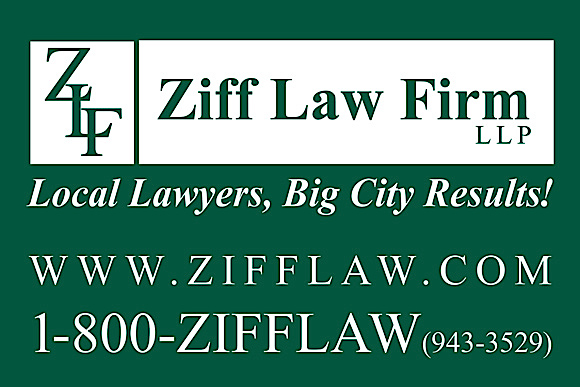![]()

For your convenience, we have installed the link below to make donations to this website easier. Now you can utilize your PayPal account or your credit card.
--------------
Our Primary Pages
Sports
People
Features
Business
Government
Forum
Schools
PSA
Calendar
History
Obituaries
Wine & Tourism
Classifieds
-----------
To reach the Ziff Law Firm website, click on the ad below.

When it comes to wills,
the process can get messy

The following is the fourth in a series of columns by Jim Reed, managing partner of the Ziff Law Firm, regarding news of a legal nature that readers might find timely in this ever-changing world.
By Jim Reed
Managing partner
Ziff Law Firm, Elmira
 A will is one of the most important legal documents a person can draft with a lawyer.
A will is one of the most important legal documents a person can draft with a lawyer.
A will allows a person to dictate who inherits their assets and possessions upon death, and avoid the intestate process (when someone dies without a will). If you die without a will, a court becomes involved in distributing your assets, which could be costly and take months to years.
If you want to leave specific property to specific people, you should have a will.
If you have children and you want to request a particular guardian or guardians for your children, you should have a will.
Make sure to speak with your named executor regarding your wishes, and ideally communicate those wishes in writing so that the executor clearly understands your wishes.
The executor, selected by you and with their approval, is expected to carry out the terms of your will.
Finally, give a copy of your will to your executor.
Those basic steps make the process sound orderly and routine. But sometimes, wills get snagged and expose the fault lines in families. Issues that appeared to be simple to resolve can divide family members and have life-changing implications.
An Odessa File reader recently contacted me with questions about a family will that is not being obeyed. The resident said the lawyer who wrote the will and the executor did not follow through on all the steps spelled out in the will, leading to litigation that has continued for many years.
The resident asked me what they could do to remedy the situation.
Although I personally limit my practice to personal injury and medical malpractice and do not draft wills or handle estate litigation, here is my answer:
The courts exist to enforce the laws. It sounds like the lawyer and executor allegedly violated the law, so the Odessa File reader's remedy is to take them to court to enforce the law. Unfortunately, going to court can be a long and expensive process, particularly in complex or unusual situations.
Hopefully, in the end, justice will be done.
To learn more about probating a will in New York State: https://www.nycourts.gov/courthelp/WhenSomeoneDies/probate.shtml.
Do you have legal questions? Please take this opportunity to email me at jreed@zifflaw.com with your questions and suggestions for columns. And if you see me in the community one day, stop and say hello.
Thanks for reading!
Jim
**********
To see Jim Reed's first column, click here.
To see Jim Reed's second column, click here.
To see Jim Reed's third column, click here.
Charles Haeffner
P.O. Box 365
Odessa, New York 14869
